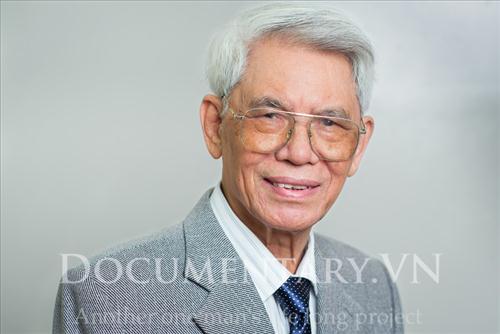
Born in a poor coastal village - Diem Dien salt village (Thai Thuy district, Thai Binh province), where people work hard all day to give the world precious salt grains that are salty with sweat, there is no tradition of education, but, unlike most of his peers, Associate Professor, Dr. Le Huy Tieu was a studious boy from a young age, loved to read books, especially loved poetry and literature and showed his literary inclination quite early (he won a prize in a writing contest for children during the French colonial period). Growing up a little, the thing he loved to read the most was still novels, especially classic Chinese novels that were always his bedside books. Literature has been ingrained in him since then, when he had the opportunity to study abroad in China, the major he chose to study was none other than Literature.
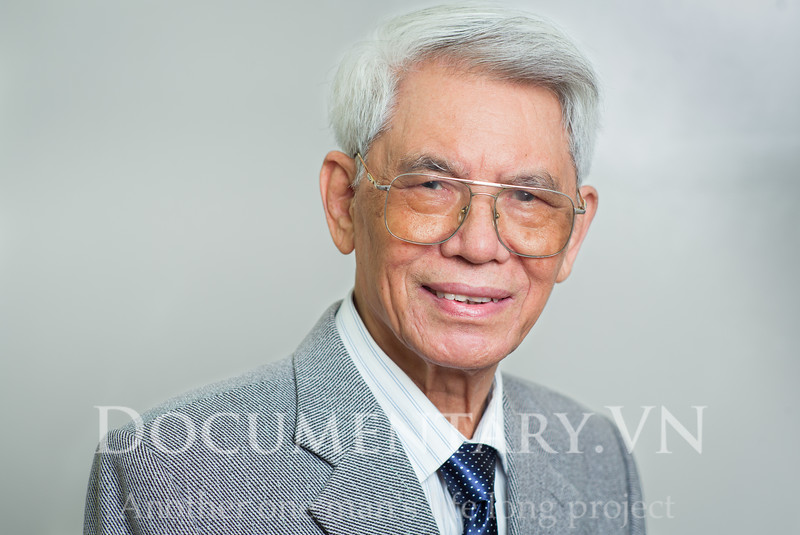
Associate Professor, Doctor, Meritorious Teacher Le Huy Tieu/Photo: Thanh Long
After completing high school in 1954, he was sent to China to study. After a year of studying Chinese at the Nanning Campus, he officially became a student at Shandong University, China. During his 5 years studying at this famous school (1955-1960), he was always an excellent foreign student, respected and loved by teachers and friends. The proof is that until a few years ago, when he returned to the school to celebrate the school's founding anniversary, he still brought back the full and intact affection between teachers and students, friends from other countries, with memories of "a glorious time" that seemed so far away.
Graduated from Shandong University with honors in 1960, upon returning to Vietnam, he was accepted to work at the Faculty of Philology, Hanoi University of Science and worked at this beloved school for 40 years until his retirement (in 2000). During those 40 years, following Professors Dang Thai Mai, Truong Chinh..., he contributed significantly to the training of many generations of students and the development of Chinese studies in Vietnam.
As a teacher, he teaches 200 to 300 hours a year to students of all faculties. Initially, when he first came to work at the school, he was assigned to teach ancient Chinese literature, but there was a period when there was a shortage of staff, so he had to take on modern Chinese literature and later contemporary Chinese literature. This heavy workload also created opportunities for him to approach more deeply and achieve new achievements in the research of modern and contemporary Chinese literature, contributing to filling the gap in the research community of Chinese studies in Vietnam.
During his teaching career, in addition to guiding hundreds of university graduation theses for students of the faculty as a mandatory task every year, up to now, after retiring for fifteen years, he has guided dozens of graduate students and doctoral students to successfully defend their master's theses and doctoral theses at the school as well as other training institutions such as Hanoi National University of Education, Institute of Literature... With his professional reputation, although he has been retired for more than ten years, he is still regularly invited to participate in many doctoral thesis evaluation councils in Hanoi and Ho Chi Minh City. And just recently, in September 2013, although he is past the "rare" age, he was personally invited by Guangxi Nationalities University to be a visiting professor for this school.
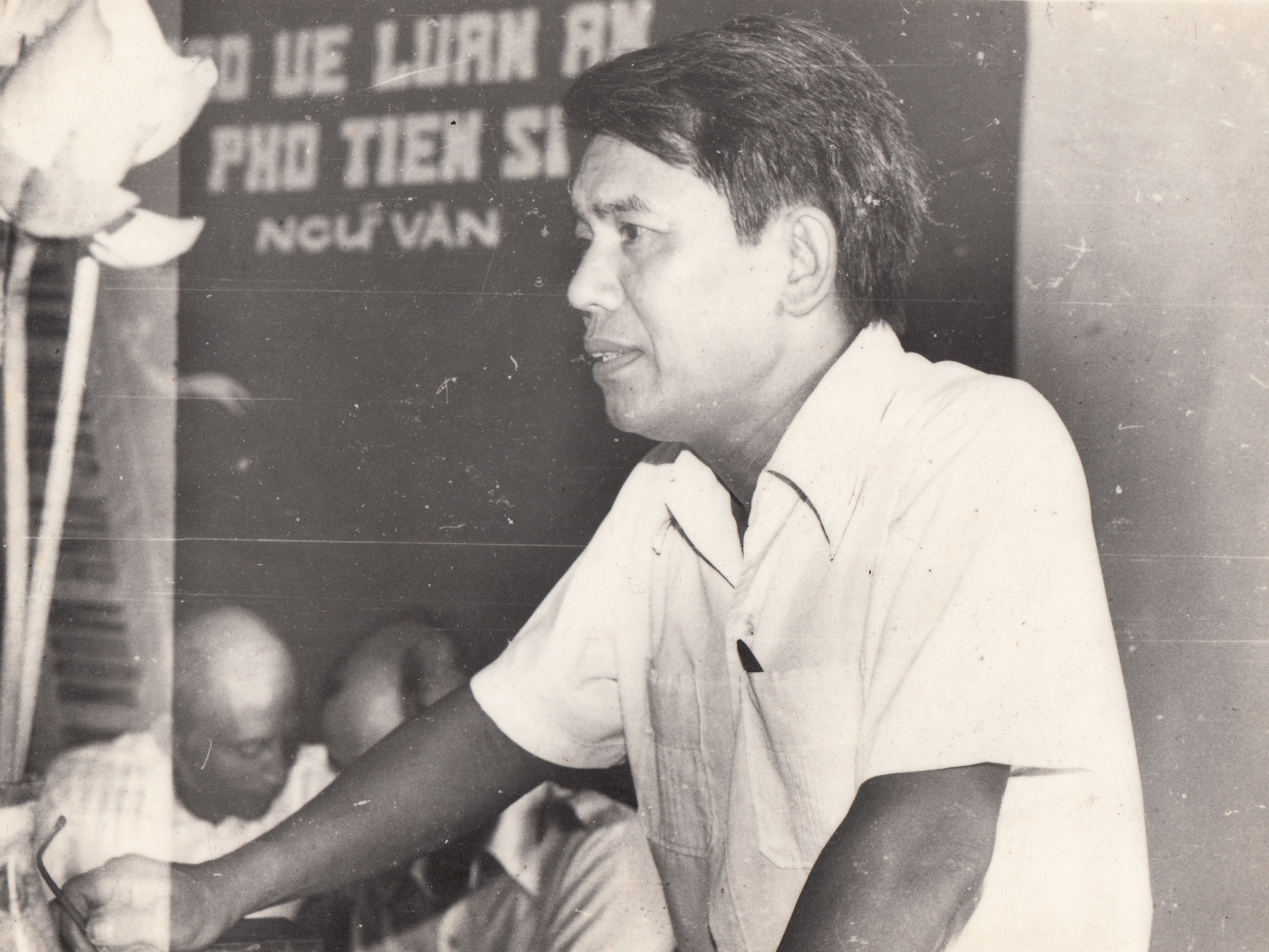
Associate Professor, Dr. Le Huy Tieu in his youth
Working at a research university, his teaching and training work always goes hand in hand with research, and sometimes research work seems to be more important. Over the past few decades, both while working and after retirement, he has written dozens of research articles on Chinese culture and literature published in specialized journals such as the Journal of Literary Research, the Journal of Chinese Studies, the Journal of Foreign Literature, etc. He has also presided over many research topics at various levels, for example: presiding over a university-level topicRecently appeared Sino-Vietnamese words in social sciences(accepted in 1995), co-chair of the projectNew books and their influence on Vietnamese society in the late 19th and early 20th centuries(accepted in 1997, published by the National Political Publishing House in that same year). And especially, with the desire to guide and nurture the younger generation when "the old bamboo but the young bamboo has not yet grown", even though he had retired and no longer had to shoulder any responsibilities, he still proposed and, together with a young staff member in the department, co-chaired a special topic at the Hanoi National University level calledInnovation in Chinese literary criticism theory during the reform and opening up period (1978-2000)(accepted in 2009, has been revised and published into a book). In addition, he has chaired many seminars on Chinese and Korean literature (such as the New Book Seminar, the Influence of Korean Culture and Literature Seminar...) in Hanoi and Ho Chi Minh City, attended and wrote articles for many seminars on Chinese literature in Beijing, Shandong, Guangxi...
In the early 90s of the last century, in the context of the normalization of relations between Vietnam and China after the war, the need to learn Chinese and learn about Chinese culture increased, in the situation of lack of textbooks and documents, especially tool books, he and his colleagues promptly compiled a set ofChinese - Vietnamese Dictionary(Social Sciences Publishing House, 1993). This dictionary was later reprinted many times and is still considered one of the best Chinese-Vietnamese dictionaries, favored by learners. In addition, with his extensive knowledge of Chinese culture and literature, he also compiled valuable books such as:Chinese idioms dictionary(Social Sciences Publishing House, 1993),Chinese Fables(Women's Publishing House, 1993)…
With his knowledge of Ming and Qing novels and the Chinese language, he (along with his close colleague, Associate Professor Le Duc Niem) was often invited by publishers to proofread and write introductions for the Vietnamese translations of classic works of Chinese literature that they published. Masterpieces such as:Romance of the Three Kingdoms, Water Margin, Dream of the Red Chamber, War of the Eastern Zhou Dynasty… published in Vietnam mainly edited and introduced by the teacher with new perspectives.
In addition to teaching and researching, he is also known as a famous translator. Throughout his career, he has edited or personally translated many important and valuable works.
First of all, aware of the lack of textbooks and reference materials on Chinese literature, in order to facilitate students in receiving foreign literature and avoid the situation of "learning by rote", he proposed and took the lead in translating many textbooks and valuable works in Chinese literature, such as the main editor of the translation of the following textbooks:History of Ancient Chinese Literature, History of Modern Chinese Literature, History of Contemporary Chinese Literature;or translated many novels, novellas, short story collections of famous contemporary writers such as Mo Yan, Jia Ping Ao, for publishing houses of Literature, Writers Association, Education, Labor...
In the context of increasingly profound globalization and increasingly strong integration trends, new literary theories that China absorbs from the West and applies to China are becoming more and more popular, while we are often "the ones who follow behind". Being aware of that, he has also been interested in translating and introducing Western literary theories as well as applying them in China, such as theories of Comparative Literature, Postmodern Literature, ambiguous poetry, stream of consciousness art, etc.
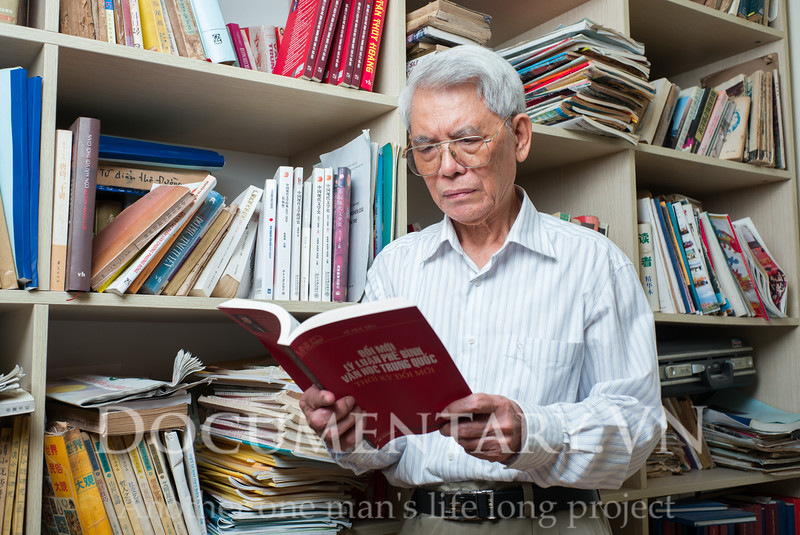
It can be said that Associate Professor, Dr. Le Huy Tieu is a multi-talented teacher. In addition to being a teacher, researcher, and translator, he is also a “cardless journalist”. For decades, he has been a regular contributor to many newspapers such as: Van Nghe, Thanh Nien, Tien Phong, Nhan Dan, Lao Dong, Hon Viet, The Gioi Moi, Kien Thuc Ngay Nay… with hundreds of articles on Chinese culture and literature. In this field, he plays the role of an ambassador for cultural and literary exchange between Vietnam and China.
The title for the article about the teacher isA lifetime of "immersion" in Chinese literature, the writer did not use any "exaggeration". Not "passionate" at all, even though he had been retired for fifteen years (exactly the same length of time Thuy Kieu wandered) and was already "eighty", he still worked day and night on each word, and in just the last five years, he had published several books (translated and written):Chinese novels in the reform and opening up period(Vietnam Education Publishing House, 2011),Comparative literature textbook(translated, Vietnam Education Publishing House, 2011),Innovation in Chinese literary criticism theory in the reform period(Hanoi National University Publishing House, 2014), not to mention the many articles regularly published in magazines (such as the magazine "Theory of Literary and Artistic Criticism") and newspapers. If he were not "passionate", how could he still be interested in current literary issues, especially in conferences on translated literature and Chinese culture and literature? Just last year, when the Faculty of Literature organized the International Conference on Translated Literature, we were partly (subconsciously) worried about his health (he often had high blood pressure, heart attacks and had to have a stent inserted), partly because of the "carelessness" of youth, no one thought to inform him, only after the conference took place did he find out, he was very sad and regretful, he blamed us but did not get angry with us. He was still the same, always kind and tolerant of the mistakes of "children". That made us feel even more guilty and remorseful. I would like to take this opportunity to apologize to you for the carelessness of my students.
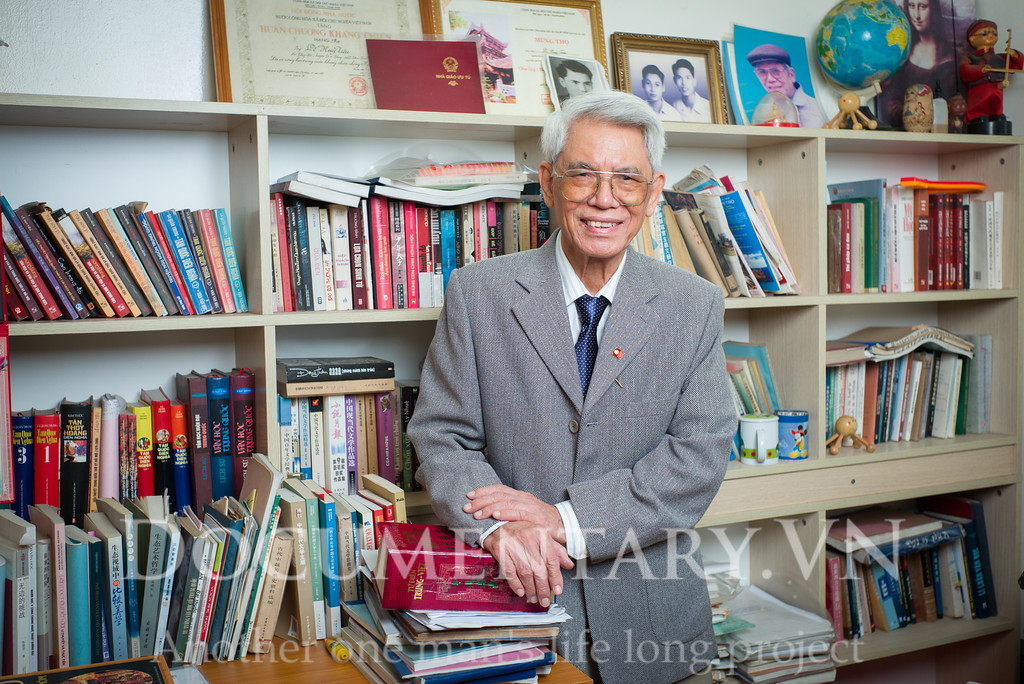
One valuable thing, and also shows the teacher's "passion" not only in science but also in the field of emotions, is that he always cares about guiding and training young cadres in translation and research by accepting research topics from the school, accepting to translate Chinese books to create conditions for young cadres to participate. Even at the present time, he is still constantly looking for good books, contacting for copyrights, sponsoring for young people to participate in translation and he often plays the role of proofreader, with the thought of letting "them" both earn extra income and improve their expertise. Perhaps only with the "banana fish passionately loves its children" sentiment can he do such things. Here, on behalf of everyone, I would like to thank the teacher for everything.
With the seriousness inherent in his personality, no matter what he did, whether it was teaching, writing papers or guiding graduate students, he always worked with a serious spirit, never doing things carelessly or perfunctorily. It can be said that seriousness has become his “brand”. To the extent that many acquaintances, when they were graduate students, brought their dissertations (even dissertations with topics completely foreign to his field of research) to him for help before submitting them to the State-level Thesis Evaluation Council). His reputation spread far and wide, and many Vietnamese graduate students studying in China also sought his help. Many students in the South, even though he had never met them, wrote to him asking for his guidance and advice. He was always enthusiastic and selfless in helping everyone. All of this was enough to show how serious and careful he was in his work, how enthusiastic and pure in his life, how “good wine needs no bush” was.
To conclude this article, the writer would like to mention a story that has nothing to do with science that the teacher often told me with pride mixed with emotional nostalgia about distant memories. The story is that during the difficult days of the war against America, there was a time when the school was evacuated to Dai Tu (Thai Nguyen), the teacher was assigned to be in charge of production to increase food rations for the staff. In every job from hoeing the land, planting vegetables, fertilizing, watering, the teacher was always proactively taking the lead, not afraid of difficulties, and even encouraged his brothers to join hands to increase production, share the joys and sorrows... Despite the hardships, it has become an unforgettable beautiful memory in the teacher's memory of a difficult time. Perhaps at this point, the qualities of a "salt village boy" were fully developed: enthusiasm for work, responsibility for work, and more preciously, the deep, salty feelings like the salt grains of his hometown Diem Dien.
|
ASSOCIATE PROFESSOR, DOCTOR, MERITORIAL TEACHER LE HUY TIEU
+ Work unit: Faculty of Literature, Hanoi University of Science (now Faculty of Literature, University of Social Sciences and Humanities, Vietnam National University, Hanoi). + Management position: Head of Oriental Literature Department, Faculty of Philology (1989-1997).
Chinese Vietnamese Dictionary(co-authored, Social Sciences Publishing House, 1992). Chinese idioms dictionary(Social Sciences Publishing House, 1993). Chinese Fables(Women's Publishing House, 1993). New books and Vietnamese society(co-editor, National Political Publishing House, 1997). New Perceptions of Chinese Culture and Literature(Hanoi National University Publishing House, 2004). Chinese novels in the reform and opening up period(Vietnam Education Publishing House, 2011). Innovation in Chinese literary criticism theory in the reform period(Hanoi National University Publishing House, 2014). |
Author:MSc. Nguyen Thanh Dien